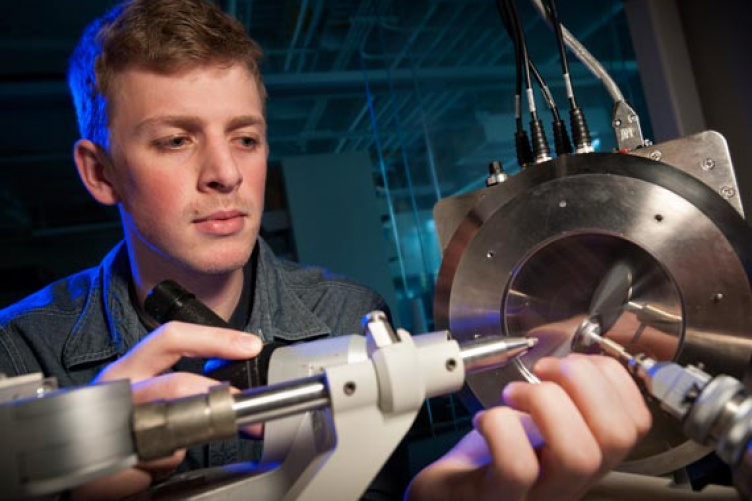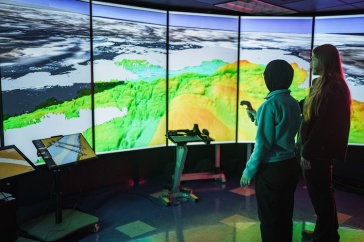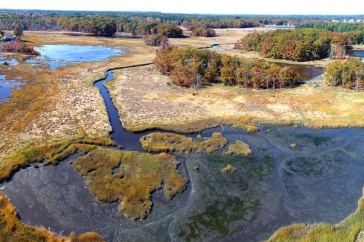
National Science Foundation winner Dan Savage. See more winners.
For the second year in a row, four UNH students have been awarded highly competitive National Science Foundation Graduate Research Fellowships (NSF-GRFP).
More than 14,000 graduate students and college seniors nationwide apply to NSF for the fellowships, which provide up to three years of support, including an annual stipend of $32,000 and $12,000 for a cost of education allowance, along with opportunities for international research and professional development. UNH’s 2014 NSF-GRFP winners are Nicole Jaskiewicz, a Ph.D. student in molecular, cellular, and biomedical sciences; Andrea Jilling, a first-year graduate student in natural resources and the environment; Sonja Pape ‘14, a senior civil engineering major; and Dan Savage ‘14, a senior in the mechanical engineering department.
Working closely with UNH molecular, cellular, and biomedical sciences professors David Townson and Vernon Reinhold, Nicole Jaskiewicz conducts research on glycans (saccharides or carbohydrates) that play a role in numerous biological processes. Her proposed NSF-GRFP project specifically relates to the influence of glycan modifications in cervical carcinoma cells.
“In my view,” Townson says, “a critical challenge to future progress in cancer research is determining how epithelial cells—such as the cervical epithelial cells Jaskiewicz will study—evade immune detection and attack following viral (e.g., HPV) infection, thus enabling tumor development and persistence.”
Jaskiewicz will conduct experiments in the university’s Glycomics Center, directed by Reinhold. “Nicole has an excellent problem to unwrap,” he says.
Hungarian-born Andrea Jilling used to think of soil as a dead substance. “Throughout my experiences working in several plant and soil science labs, along with two years of practical exposure to farming systems, I began to see soil as a living, breathing, and dynamic organism,” she says. Her current research focuses on reducing nitrogen loss in soils negatively affected by fertilizer overuse. Jilling is looking specifically at what factors enable plant roots to more effectively access nitrogen reserves in soil organic matter.
Jilling will work with Rowland H. O’Neil Professor Stuart Grandy in UNH’s soil biogeochemistry and fertility lab. “Andrea has identified a major gap in our understanding of soil nutrient cycling,” says Grandy. “Resolving this gap is critical to both agricultural and climate change sciences.”
Sonja Pape has worked closely with professor of civil engineering Jo Daniel, who describes her as an extraordinary undergraduate and a leader in the lab. Pape was the recipient of a 2013 Summer Undergraduate Research Fellowship from the Hamel Center for Undergraduate Research, has presented a poster at the Association of Asphalt Paving Technologists conference, just finished a thesis for honors in major—and is still on track to graduate in three years.
Pape’s work focuses on asphalt concrete mixtures, specifically evaluating the use of recycled materials that make asphalt concrete pavements more sustainable. Her application highlighted the potential for her future research on asphalt binders—the 'glue' that holds the pieces of aggregate together to make concrete—to improve pavement sustainability and reduce cost. She will pursue graduate work at North Carolina State University, where Daniel received her M.S. and Ph.D.
Dan Savage, who has also been awarded the College of Engineering and Physical Sciences graduate fellowship, works with assistant professor Marko Knezevic. Knezevic attributes Savage’s recent success to his “innovative ideas and zeal for research, coupled with his intellectual abilities and assiduous character.”
Savage’s proposed research, which will be conducted in collaboration with Los Alamos National Laboratory, entails combined theoretical modeling and experimental research and involves the creation of ultra-strong and formable alloys made from magnesium. It's work that Savage notes could potentially be “scaled to large commercial applications in the electronics, automobile, and aerospace industries.”
Savage will stay at UNH for a Ph.D. in mechanical engineering and intends to pursue a partnership with UNH’s Science and Mathematics Achievement through Research Training (SMART) summer program, where he can mentor potential STEM students.
Students applying for NSF-GRFP funding through UNH receive application preparation assistance from the Graduate School, the Office of Research Development & Communications (RDC), and the Office of National Fellowships, as well as from their faculty advisers. “By leveraging the combined expertise of our offices, we are generating greater awareness of and interest in the NSF-GRFP opportunity on our campus,” says RDC director Kathy Cataneo.
The NSF Graduate Research Fellowship Program is the country’s oldest fellowship program directly supporting students in science, technology, engineering and math. Since its founding in 1952, the program has funded more than 46,500 students. Notable former fellows include U.S. Secretary of Energy Steven Chu, Google founder Sergey Brin, Freakonomics co-author Steven Levitt, and more than 30 Nobel Prize winners.
By Jeanne Sokolowski, Director, Office of National Fellowships
-
Written By:
Bridget Finnegan | Communications and Public Affairs | bridget.finnegan@unh.edu | 603-862-1465
















































